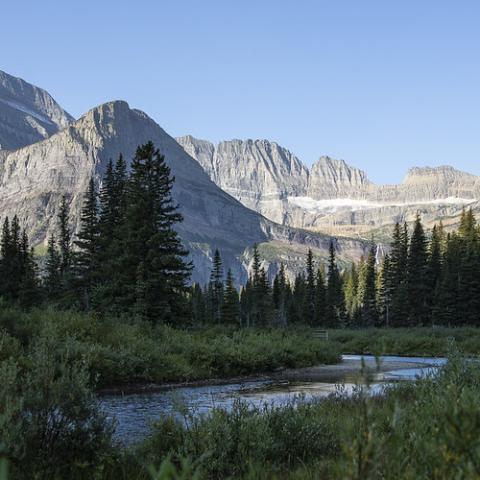
McDonald Creek, Glacier National Park / Wikipedia
A conflict over jurisdiction authority dating back to the late 1800s might ultimately force the removal of a newly built house within the boundaries of Glacier National Park.
The debate centers on two key questions: whether the property owners secured the required state permits to build their house and whether the state conservation district that ordered its removal had the legal power to mandate the demolition.
In 2022, a California couple, John and Stacy Ambler, began construction of a house on a 2,300-foot privately owned lot they bought in 2019. The lot is an inholding, a piece of private property within the boundaries of the park that predate Glacier National Park's designation. There are roughly 100 such inholdings in Glacier. The Ambler's lot was established in the late 19th century as part of what was once a small farming plot called Apgar. Today, Apgar is one of Glacier's small villages that serves visitors with lodging and shopping opportunities.
When locals noticed that construction of the Ambler's home had encroached onto a nearby streambed, they alerted the Flathead Conservation District, which has the authority to interpret and enforce the Montana Natural Streambed and Land Preservation Act. That law strictly governs construction near sensitive waterways. As part of an investigation into the construction, the conservation district determined the Amblers never secured the necessary permits to build the home, in violation of state law. The conservation district ordered the home torn down and instructed the Amblers to apply for proper permitting before attempting to rebuild.
In response, the Amblers filed federal and county lawsuits in 2023 arguing that because the home is within Glacier National Park, the conservation district lacked the authority to order the home's removal. Further, according to court documents, the Amblers argue that because their land is privately held, and not federal property, the Montana Natural Streambed and Land Preservation Act does not apply to their construction.
U.S. Magistrate Judge Kathleen DeSoto is charged with wading through the arguments to make sense of the dispute. Earlier this week, she heard oral arguments from attorneys representing the Amblers and the conservation district.
The Ambler's attorney, real estate lawyer Trent Baker, argued that the Montana Natural Streambed and Land Preservation Act wasn't established until long after the creation of the national park, and, therefore, is irrelevant in this case, according to NBC Montana. And, in a somewhat contradictory tone to the original court filings noted above, Baker also suggested in court the state's laws don't apply because the property is within the boundaries of the national park.
The conservation district's attorney, Camisha Sawtelle, argued that because the Ambler's land abuts federal property, any construction disturbance on their land requires heightened scrutiny. “The impact you make on private land immediately impacts federal land,” Sawtelle said in court, NBC Montana reported. Sawtelle pointed out neighboring businesses secured multiple permits for construction, and the Ambler's shouldn't receive special treatment.
For their part, the Amblers argued that in 2019 the Flathead County planning office gave them the go-ahead to build and said no permits were necessary. The planning office said they could do “whatever they want with the land without restriction,” according to Hungry Horse News.
Park officials did not immediately respond to a Traveler inquiry regarding their position on the matter.
It's now up to Judge DeSoto to untangle the lines of jurisdiction and authority in the case. In the meantime, the Ambler home sits unoccupied and only partially finished through the freezing Montana winter.




 Support Essential Coverage of Essential Places
Support Essential Coverage of Essential Places






